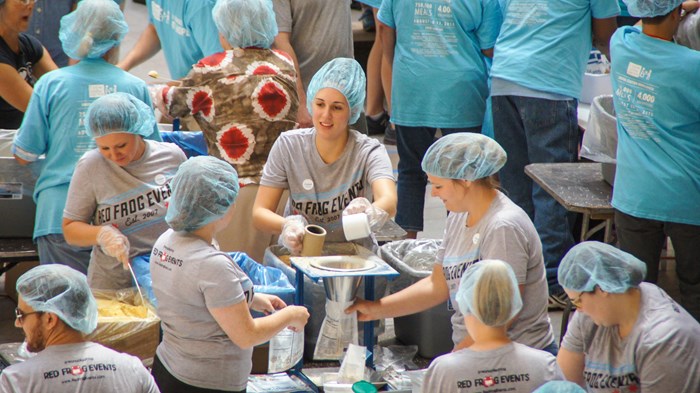What If Service Projects Are Actually Our Best Evangelistic Tool?

The hairnet felt both humbling and unifying – because everyone without exception had to wear one for the next two hours.
We stood at a long table after washing our hands, and became an assembly line carefully scooping powdered food products into containers. Our non-profit partner launched our time together with a short video describing the state of hunger in the world and how our efforts that day could make a difference for the poorest of the poor. The church rallied around this effort, bringing a massive group of volunteers in shifts to various locations in many neighborhoods.
What we quickly discovered was that sign-ups filled rapidly for all the time slots. And not just with church people. Neighbors and people at our workplaces and schools jumped at the opportunity. It was the easiest invitation ever.
If you have taken the risk at some point to invite a person who doesn’t yet know Jesus to a church service, a Bible study, or any kind of programmed event, maybe you have been met with an awkward moment of decline, when an excuse is offered and it’s obvious there is a lack of interest and openness. So why is it exceedingly easier to invite a friend to a service project?
I think the reason is primarily rooted in the almost universal longing of most people to do something to make a difference in this broken world. For a few hours, or even a full day of a work project, the volunteers can know that just maybe they can be a small force for good, and that gives us a deep sense of fulfillment.
I heard a message taught by Pastor Ben Cachiaras where he stated that in many ways, Service is the new apologetic. It can be the front door experience for someone not yet in the family of God – a primary pathway that leads to rubbing shoulders with followers of Jesus, and maybe stirs up a curiosity about the faith that compels us to love and serve others.
When a person shows up for a church service or ministry event, quite often there is a resistance, apathy, or even skepticism formed by moments in their past. These hurdles create a barrier to openness. But a service project can feel much less threatening. Of course there may be some anxiety about whether one has the necessary skills for the work project. But those can be addressed up front as we seek to align people with service that is doable for them.
The church I am a part of in the West Loop of Chicago decided a couple years ago to cancel services on a Sunday morning and instead offer several opportunities for work projects in the community. My husband and I chose to serve in a community center’s kitchen, mostly washing dishes and cleaning. Our daughter Samantha chose to sign up for sorting clothes in a homeless shelter. Her group leader sent out a text on Saturday night saying that a few more volunteers were needed. So Sam texted eight friends who had never agreed to come to church, asking if they could come to the shelter. All eight friends showed up. I believe her generation is even more socially conscious than mine.
Samantha puts it this way:
We want to be part of restoration. I believe that if the church were to place a disproportionate emphasis on responsive and sustained service to the vulnerable, young people would flock to be a part of it.
I am not suggesting some kind of manipulative strategy to get people to church. Rather I believe that by simply obeying the commands of Jesus to serve the least of these, a magnificent opportunity exists to shine like stars in the universe, to offer a beacon of hope not only to the under-resourced, but also to all of us who have far more than we need and a deep desire to quit living such a self-centered life. For surely it is in the giving away of our time and money that we find true life and genuine joy.
When it comes to measuring “evangelistic success”, it could be argued that this approach is awfully slow, a little messy, and extremely hard to measure results. True. But when someone outside the faith witnesses the genuine love of those on the inside, a seed is sown that may bear fruit down the road.
As we read in I Peter 3:15, Christ followers may be asked to give a reason for the hope that we have, and to “do this with gentleness and respect.” With the harsh divisiveness in our culture today, how vividly we would stand out if we were known for gentleness, respect, and good works.
I remember that young children were included in the food packing project, with a hairnet on their little heads. I choose to believe that a memory was made for them that day, a memory of working together with kind people to help the hungry. Down the road they may be stirred up to explore the Source of that love and seek out the love of the ultimate Servant, our Savior.
Nancy Beach serves as a leadership coach with the Slingshot Group and on the teaching team at Soul City Church in downtown Chicago. Previously, Nancy served as the programming director at Willow Creek Community Church in suburban Chicago. She is co-author with her daughter Samantha of Next Sunday: An Honest Dialogue About the Future of the Church, and she is also the author of An Hour on Sunday and Gifted to Lead.
The Better Samaritan is a part of CT's
Blog Forum. Support the work of CT.
Subscribe and get one year free.
The views of the blogger do not necessarily reflect those of Christianity Today.






















